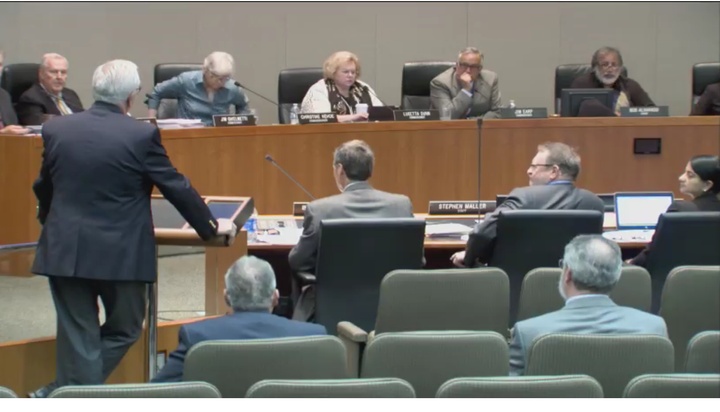
Doug Bosco, former North Coast congressman and current legal counsel for NWP Co., testifies before the California Transportation Commission Thursday.
Last week, members of the California Transportation Commission got tough with the North Coast Railroad Authority, the public agency that owns the defunct railroad tracks around Humboldt County, which has been operating in the red and selling off publicly owned property to stay afloat.
After peppering the railroad authority’s executive director with a series of pointed questions at its meeting Thursday morning, the commission asked the NCRA to come back to them in October with a couple of new documents: a business plan and a “shutdown plan.”
“It seems to me as though you should return to the commission within 90 days with two items: a viable business plan and a viable shutdown plan,” Commissioner Jim Madaffer told NCRA executive director Mitch Stogner. “Because it’s unconscionable to continue in this operation.”
The commission – which advises the executive and legislative branches of state government, among other duties – had asked the North Coast Railroad Authority to come account for itself at the request of the local Caltrans office, which had expressed concern about the railroad authority’s finances. Specifically, Caltrans wanted to hear about whether or not the railroad authority had improperly encumbered real estate bought with state funds, and also whether or not a recent audit of the authority’s books — which raised “substantial doubt” about its ability to continue — was as dire as it seemed.
In his presentation, Stogner was able to dispel the first matter more easily than the second. He assured commissioners that the authority had not “collateralized” real estate purchased with state grant monies administered by the CTC — that the authority had not borrowed against such property to balance its books. It seemed to be assurance enough. (Reached this morning, Brad Mettam, deputy director for planning in Caltrans District One’s Eureka office, told the Outpost that his office was absolutely satisfied by Stogner’s word.)
The second matter proved to be stickier. Though Stogner assured commissioners that the language used in the most recent audit of the authority’s books (“substantial doubt about the NCRA’s ability as a going concern”) was in no way new — auditors have used the same language several years running, he said — members of the transportation commission were not inclined to let the matter drop.
Under questioning from Commissioner James Ghielmetti, Stogner admitted that the North Coast Railroad Authority is running a deficit of about $200,000 per year, and that the difference is currently being made up with the sale of non-essential real estate. (Not real estate purchased with the grant monies mentioned above.) Ghielmetti said that this was clearly not a viable long-term strategy.
“Sooner or later the well’s going to run dry, because you’re not going to have enough property to sell to keep going,” Ghielmetti said.
Stogner admitted that this was the case, and said that the legislature would have to find more money to give to the railroad authority if it wished for the authority to continue. But other commissioners seemed dubious. They took up Ghielmetti’s original line of questioning and eventually endorsed Madaffer’s request for the authority to prepare a “shutdown plan.”
Reached after the meeting, Stogner told the Outpost that he would do his best to comply with the commission’s request.
“In terms of a shutdown plan — I don’t know what they want there, but I will give them whatever they want.” he said. “The whole point of going before them was that we’re doing the the best we can, and that we need some state support.”
The North Coast Railroad Authority was formed by the California state legislature in the late ‘80s, when it began to purchase, in pieces, the old railroad line between Marin County and Humboldt County. The line to Humboldt was closed in 1997, after a storm destroyed track in the Eel River Canyon. In the last few years, the authority and its exclusive freight operator — a company called NWP Co., partly owned and legally represented by Stogner’s former boss, former U.S. Congressman Doug Bosco — have opened up a small section of the southern end of the line, and have been running a couple of trains weekly between Napa and Petaluma.
Bosco also spoke at the California Transportation Committee, where he said that his company has no plans to ever run freight trains outside the extreme southern end of the North Coast Railroad Authority corridor.
“About 240 miles of this railroad will probably never be operated,” Bosco said. “You talk about coming up with a shutdown plan — that would have to go to the legislature, because the legislature determined that this railroad exists. We as a private company are not going to operate from Napa to Eureka. We are operating profitably from Napa to around Windsor.”
Several local planning efforts — including, most notably, the Eureka-Arcata Bay Trail — are still required by the North Coast Railroad Authority to take the eventual return of rail service into account, sometimes adding extra impediments that can add hundreds of thousands or millions of dollars to the price tags of such projects.
###
VIDEO:
- California Transportation Commission video archive. Choose “June 29, 2017” in the dropdown menu and fast-forward to about the 9-minute mark.
CLICK TO MANAGE